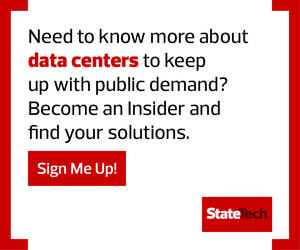As technology advances, organizations must increasingly dissect, analyze and apply data to drive improvements in critical areas such as identity management, fraud detection, service delivery and government trust. SLGs have the power to do more with data assets and secure them successfully.
To achieve more advanced data outcomes, SLGs should amplify data education and automation, prioritize data leadership and focus on maturing data analytics, leading organizations to implement a modern data experience.
1. Improve Data Education and Automation Practices
A majority of SLG leaders say that the top roadblock to turning collected data into meaningful analytics is the lack of available resources in terms of a data-savvy workforce.
To help close the gap, IT leaders should identify a potential group of data management and analytics experts, invest in training opportunities, and increase automation to take pressure off an already overworked department.
Leading organizations use resources wisely — both technology and human capital — to maximize data value. And SLGs can gain a lot from maximizing their data.
RELATED: What are the 5 V’s of Big Data and why do they matter for agencies?
2. Prioritize Data Leadership in Government
The chief data officer position is proving to be essential at all levels of government, but particularly at the state and local levels. According to the MeriTalk report, 74 percent of state and local organizations have one in place, with the majority adding the position in the past two years.
A strong CDO can help organizations forge a data-first mentality, secure essential buy-in from non-IT leadership and make data management the priority it needs to be. The longer an organization has a CDO, the more likely it will give its use of data to create meaningful information an “A” grade.
The future of virtual government depends on state and local leadership buy-in, and IT leaders can be change agents for their organizations when it comes to investing in the right solutions.
DIVE DEEPER: How is California using a geospatial data portal?
3. Mature Agencies’ Use of Data Analytics
Lastly, SLG IT leaders are working tirelessly to improve their understanding of their data while simultaneously increasing data security and quality. According to the MeriTalk report, agencies have improved their use of data analytics over the past year, and the vast majority are seeing improvements in SLG priorities such as cybersecurity and public safety.
As the flood of data continues to rise, organizations must advance along with the data analytics maturity model.
Most remain in the early to middle stages, and it’s imperative to progress from information collection to optimization.
EXPLORE: How can data aid states in their economic recovery?
A Modern Data Experience for Analytics
As organizations handle a growing amount of data, it is crucial to ensure that value can be extracted. By maximizing data, organizations can expand artificial intelligence and Big Data capabilities and harness the power of data to advance their missions.
Until recently, organizations could rely on storage appliances that supported the needs of a single application or type of workload. However, many organizations are limited by how their legacy infrastructure manages so much unstructured data. As a result, they must deal with higher costs, increased inefficiencies and greater complexities.
State and local organizations should implement a modern data experience that offers a Storage as a Service approach. This enables them to extract more value from their data while reducing the complexity and expense of managing infrastructure.
A modern data experience is simple: It should be API-defined, with easy, common management tools and proactive analytics that are actionable at scale. It should also be seamless and sustainable, allowing organizations to buy only what is needed at any given time.
By making sense of data through AI and analytics, SLGs can simplify operations, power data insights, and transform legacy infrastructure for agile delivery with modern structured and unstructured data. While focusing on improved data education, highlighting data leadership and maturing data analytics, SLGs will continue serving citizens and meeting changing missions.











